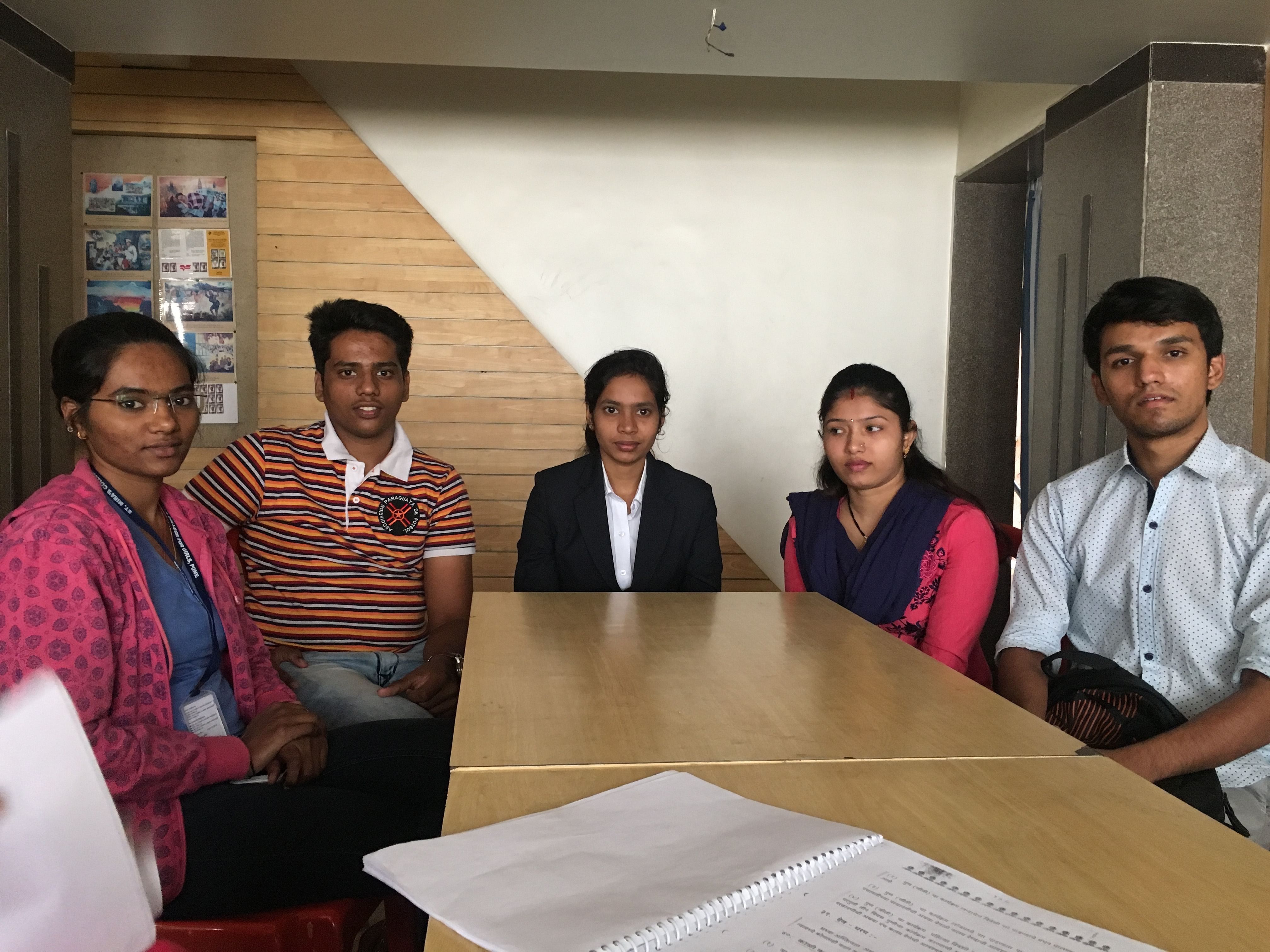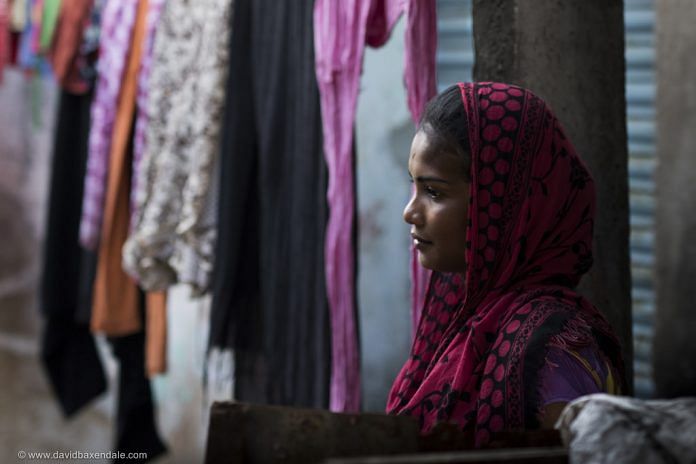At the behest of community elders, the Kanjarbhat tribe still practices ‘gun’. But now, community youth have taken up cudgels to bring about a change.
Pune: More than 70 years ago, Janabai Indrekar, then a shy teenager, was given a white sheet on the night of her wedding. Her community’s elders pushed the newlyweds inside a room and waited at the bolted door for the couple to have their first intercourse after marriage.
Content on seeing the white sheet blotted with blood, they returned home. The day after, Janabai and her husband had to be present before a large gathering of nearly their entire community, where the bedspread was displayed. An elder asked Janabai’s husband, “Maal khara ahe ka khota? (Is the ware real or fake?)”, a metaphor to ascertain whether the bride was a virgin. In front of a full audience, including Janabai and her family members, her husband said, “khara, khara, khara (real, real, real)”, and the gathering rejoiced.
Generations of Janabai’s family and pretty much every Kanjarbhat woman she knows have had to undergo such a virginity test. At the behest of the Kanjarbhat community’s ‘caste panchayats’, the practice has survived through the ages, and is imposed upon all Kanjarbhat women, even those who live in some of Maharashtra’s modern cities such as Mumbai, Pune, Kolhapur and Nashik. This, despite Maharashtra having enacted a law against social boycott, discrimination and the extra-judicial power of caste panchayats.
Sitting on a cot in her one-room house in Yerawada in Pune, Janabai, now over 90, told ThePrint: “My parents and relatives mentally prepared me for this. But, I was scared of the caste panchayat, worried that they might come back and make some big ruling about my marital life, family, or demand money, though I passed their test. My daughters faced this, but I don’t wish this on my granddaughters now.”

Who are the Kanjarbhats?
The Kanjarbhat community, which has a population of about 50,000 in Maharashtra, is a denotified tribe, nationally identified as ‘bhantu’, and in Rajasthan and Gujarat as ‘sansi’ and ‘chara’ respectively. The customs laid down by the community’s caste panchayats, including the concept of a virginity test, are similar across the country.
In September 2000, the Akhil Bharatiya Sanhasamal Kanjarbhat Samaj Sangh, a group of community leaders, put down the society’s caste panchayat laws and regulations in a booklet. The booklet, a sort of quasi-constitution for the community, specifies fees that the caste panchayat should take while solving disputes, performing marriages or other rituals, as well as the punishments and penalties in case of inter-caste marriages, adultery, incest, pushing the community’s girls into prostitution, and so on.
The booklet also mentions the virginity test ritual. It says: “Till a further decision, the tradition of ‘gun’ (the community’s term for the virginity test) has been kept alive. But there are some changes needed in this, and decisions will be taken in following meetings.”
Pressure through porn
As per the booklet, it is mandatory to conduct the virginity test on the day of the wedding, and it can be held in a lodge. It adds that if for some reason the bride and groom cannot go through the virginity test the same night, they will be given three days.
However, Nandini Jadhav from the Maharashtra Andhashraddha Nirmulan Samiti (MANS), an organisation started by murdered rationalist Dr Narendra Dabholkar, said that in practice, the caste panchayats put immense pressure for the virginity tests to be conducted on the wedding night itself.
“Often, couples are not able to consummate their marriage immediately. The girl could be scared. But there have been cases where the caste panchayats have put pressure by making the couples see pornographic films, or pushing family members on both sides to help the bride and groom,” Jadhav said.
If the girl fails the virginity test, she has to face boycott, public humiliation, and at times even physical harm, Jadhav said. Moreover, youth from the community said that besides the nominal amounts laid down by the community in its booklet of rituals, caste panchayats often extort more money from the bride and groom, depending on the families’ affluence and social standing.
Community’s gen-next fighting for change

Krishna Indrekar, now a Maharashtra government employee, and his wife Aruna, were one of the first few couples to openly defy the practice and tie the knot at a marriage registrar’s office on 1 January 1996. The local caste panchayat immediately issued a written directive to all members to boycott Krishna, now director of finance at the Maharashtra State Charities Commission, and his family.
Over the years, the couple has inspired many young Kanjarbhats to raise their voices against some of the community’s regressive practices. More recently, a group of about 40 youngsters from across Maharashtra have come together under the banner ‘Stop the V-ritual’, a movement that has gained momentum over the past three months.
MANS has been giving organisational support to youngsters striving to rid the society of this practice.
Siddhant Indrekar, Krishna’s 21-year-old nephew and student of Pune’s Nowrosjee Wadia College, has been one of the faces at the forefront of this movement. Siddhant registered a complaint against his community’s caste panchayat at Pune’s Vishrantwadi police station in November after he attended his own relative’s wedding where members of the caste panchayat demanded Rs 5,000 each from the families. Siddhant captured it on video and took the footage to the police.
“The police called both the families, but under pressure, both sides said they were giving the money out of their free will. Nothing became of the complaint,” he said.
The Vishrantwadi police station, however, conducted an interactive session with the leaders of the Kanjarbhat community, along with representatives of MANS.
Jadhav said: “Some women members actually said the community’s practices are directly related to the dignity and respect of women. The meeting simply ended with the police requesting community elders to ensure that caste panchayats do not operate anymore. But ideally, the police should take action simply on the basis that these caste panchayats exist, as they are not legal according to Maharashtra’s anti-social boycott legislation.”
An officer at the Vishrantwadi police station said the complaint is still being probed, but prima facie there is no evidence of illegality. “In this particular case, there is no evidence of any discriminatory or regressive practices such as the virginity test. So, as per laws, it is not possible to clearly say whether those gathered at the wedding were a caste panchayat or simply a group of well-meaning elders,” he said.
A month later, Siddhant’s friends who are part of the rebel group were beaten up at another wedding in Pimpri Chinchwad. Seventeen-year-old Sourabh Machle said: “We were simply attending the wedding, but the panch (caste panchayat leaders) did not allow us. A group of people assaulted us for just being there simply because we are part of a group that opposes these traditions.”
Change should be gradual
Kavichand Bhat, a Kanjarbhat community elder, a former panch, and a former mayor of Pimpri Chinchwad, did not comment on the community’s virginity test, but said traditions and rituals had evolved over the years.
“People over the years have retained what is good and discarded what is bad. There will be change in the future too, but it has to be a gradual process. Nothing happens overnight like some youngsters are demanding,” Bhat told ThePrint.
Bhat, 72, was a signatory to the booklet determining the community’s rules and regulations in 2000. In 2015, he was arrested by the Aurangabad police in a case about social boycott.
Bhat said youngsters are often not aware of how far their community has come from being untouchables, branded “criminals” and a nomadic tribe, to now gradually being part of mainstream politics and producing doctors, engineers, police officers and so on.
“The traditions came about in those days. Every society has its own traditions, and these are not rigid, but a society needs time to change. If these children think some of these traditions are wrong, they should work towards changing them productively, respecting the society and taking it along,” Bhat said.
The community’s elders have organised a meeting of Kanjarbhats from across Maharashtra at Ichalkaranji near Kolhapur on 5 and 6 February. Bhat said the community intermittently keeps having such sessions to work towards its development.
Siddhant Indrekar and his friends are, however, hopeful that this could mark the beginning of change.




It would be fair if the men were asked to prove their virginity as well.